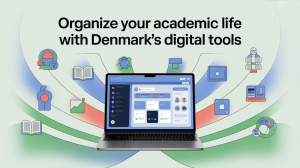Top 10 Essential Tips for New International Students in Denmark
Tip 1: Attend Pre-Semester Introduction Events and Language Classes
Tip 2: Prepare All Required Documentation in Advance
Tip 3: Understand and Meet Application Deadlines
Tip 4: Secure Appropriate Health Insurance
Tip 5: Engage with Danish Students and Ask for Help
Tip 6: Get Involved in Student Communities
Tip 7: Arrange Accommodation Early
Tip 8: Embrace the Outdoor Lifestyle
Tip 9: Learn Basic Danish Phrases
Tip 10: Familiarize Yourself with Public Services and Digital Tools
Conclusion
Take the Next Step with Study in Denmark
Embarking on an educational journey in a new country can be both exhilarating and daunting. For international students heading to Denmark, understanding the local culture, educational systems, and practicalities of daily life is crucial for a successful transition. This blog outlines the top 10 essential tips for new international students in Denmark, ensuring a smooth start to your academic experience.
1. Attend Pre-Semester Introduction Events and Language Classes
One of the best ways to ease into your new environment is by attending pre-semester introduction events and language classes offered by your university. These sessions serve several purposes:
- Orientation: Gain insights into the academic structure and resources available at your institution.
- Cultural Understanding: Learn about local customs, traditions, and life in Denmark.
- Networking Opportunities: Connect with fellow students from diverse backgrounds, making friendships that will last throughout your studies.
By actively participating, you set a solid foundation for your academic journey.
2. Prepare All Required Documentation in Advance
Before arriving in Denmark, ensure that you have all the necessary documentation organized. This preparation includes:
- Letter of Admission: Your official acceptance letter from the university.
- Student Visa: Required for non-EU students.
- Proof of Language Proficiency: Depending on your program, submit evidence of either English or Danish proficiency.
- Academic Transcripts: Have your transcripts translated into English or Danish if required.
- Financial Documentation: Show proof of financial means sufficient to support yourself during your studies.
- Private Health Insurance: Purchase insurance covering you prior to receiving your yellow health card after registration.
By tackling this ahead of time, you avoid any unnecessary stress upon arrival.
3. Understand and Meet Application Deadlines
Timeliness is crucial when applying to universities in Denmark. Here are some key points:
- Application Periods: Typically, applications open in January with deadlines around March for non-EU students.
- Specific Requirements: Each university may have unique deadlines, so verify this information on your university’s website.
- Complete Applications: Ensure that your application is comprehensive, as late submissions are often rejected.
Being proactive in managing your application will help you secure your place in your desired program.
4. Secure Appropriate Health Insurance
Denmark provides a robust public healthcare system, but international students must arrange for private health insurance until they are officially registered. Consider these aspects:
- Coverage: Ensure your health insurance covers potential medical expenses until you obtain the yellow health card.
- Duration of Coverage: Look for policies that provide coverage for both the transition period and any unforeseen circumstances during your stay.
A solid health insurance plan protects your wellbeing during your studies.
5. Engage with Danish Students and Ask for Help
Building relationships with local students can significantly enhance your experience. Consider the following:
- Ask for Advice: Don’t hesitate to seek guidance on navigating university systems, using public services like MitID, or adjusting to daily life.
- Understand Everyday Life: Danish students can offer practical tips that textbooks may overlook.
Engagement with locals enriches your cultural exchange and helps you adapt more quickly.
6. Get Involved in Student Communities
Joining student communities, clubs, or societies is a great way to meet people and foster connections. Benefits include:
- Social Integration: Building a network of friends and peers who share your interests enhances your student experience.
- Opportunities for Involvement: Many groups organize events, volunteer opportunities, and workshops that can enrich your study time.
Active participation enables you to maximize your time in Denmark, both academically and socially.
7. Arrange Accommodation Early
Finding suitable housing in Denmark, particularly in metropolitan areas, can be challenging. Steps include:
- Start Early: Initiate your search for accommodation as soon as you receive your acceptance letter.
- Explore University Housing Options: University-managed housing can be a convenient choice for international students.
- Be Flexible: Consider various locations to secure the best options available.
By planning your living situation early, you will eliminate one of the main stressors of relocation.
8. Embrace the Outdoor Lifestyle
Danish culture places high value on outdoor activities and a healthy lifestyle. To fully integrate, aim to:
- Ride a Bicycle: Biking is a common mode of transportation and a quintessential aspect of life in Denmark.
- Explore Parks: Utilize the numerous parks and natural settings available for recreation and relaxation.
Embracing this lifestyle can not only improve your physical health but can also immerse you deeper into Danish society.
9. Learn Basic Danish Phrases
Although many Danes speak fluent English, showing respect for the local culture by learning a few Danish phrases is beneficial. Practicing basic phrases can:
- Ease Daily Interactions: Use Danish greetings or simple requests to build rapport with locals.
- Aid Communication: Familiarity with the language assists in navigating bureaucratic processes or services.
Demonstrating this effort can lead to positive interactions and enhances your cultural experience.
10. Familiarize Yourself with Public Services and Digital Tools
Navigating the essential services in Denmark may feel overwhelming at first. Key tools and services to familiarize yourself with include:
- MitID: The digital ID system widely used in Denmark for accessing public services.
- University-Specific Resources: Utilize guides provided by your institution to become comfortable with services you will frequently use.
Understanding how to navigate these systems will ease your transition into daily life.
Conclusion
Transitioning into life as an international student in Denmark is an exciting journey filled with opportunities for growth and exploration. By following these essential tips, you can ensure a smoother adjustment to your new academic and social environment.
At Study in Denmark, we are committed to supporting international students as they embark on their educational journeys. From university admissions assistance to valuable resources tailored to your needs, we provide comprehensive guidance every step of the way.
Take the Next Step with Study in Denmark
Explore the opportunities available to you and begin your adventure today.




